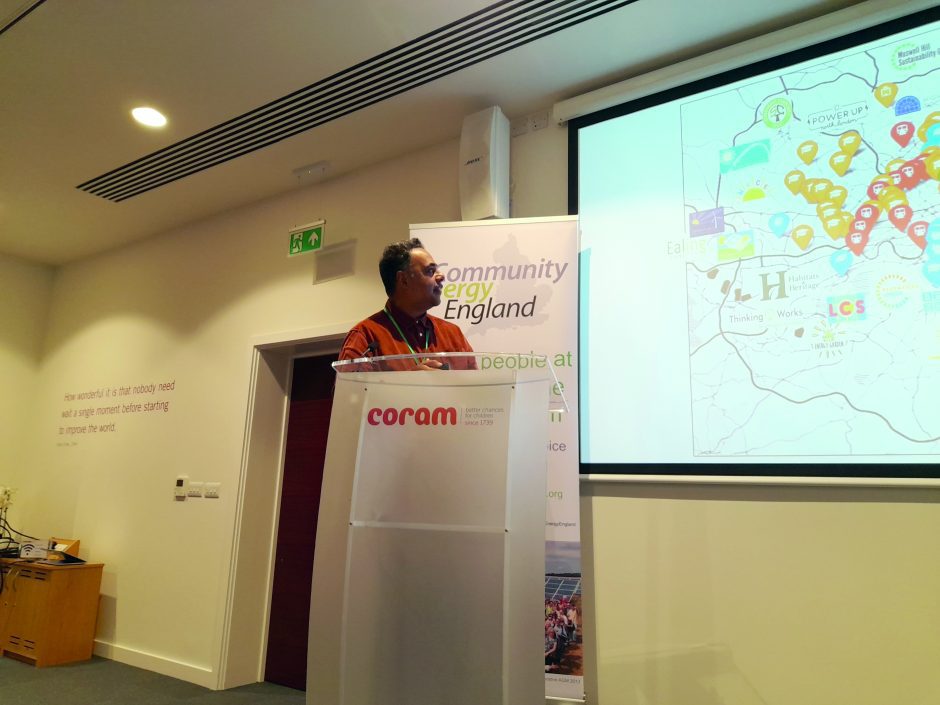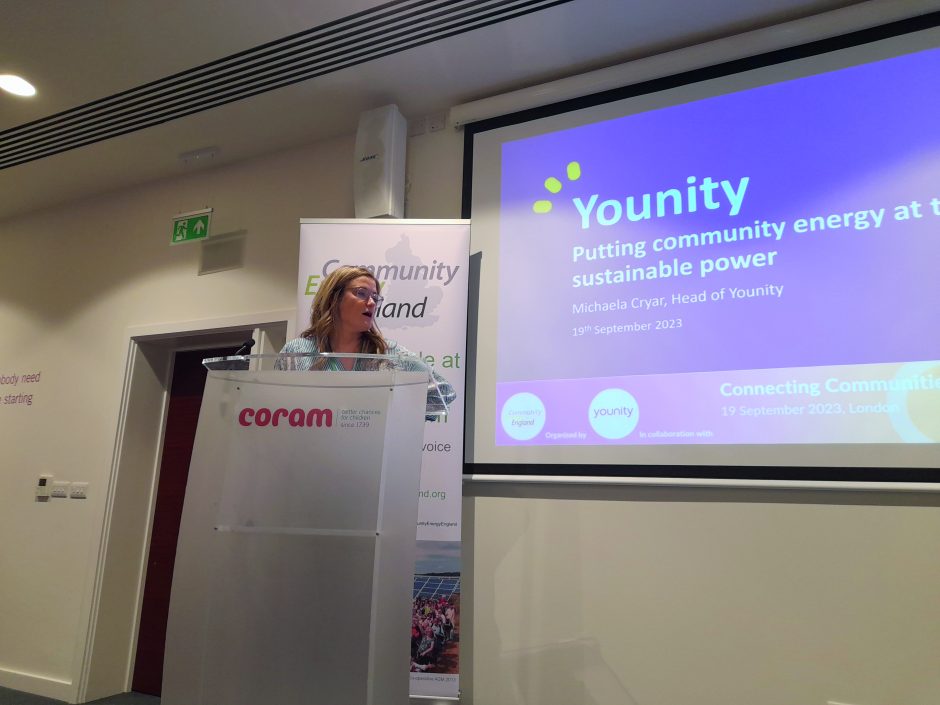Community Energy England (CEE) held its summer conference in London on 19 September, looking for ways to advance the sector’s work against the threat of climate change.
The event came as the sector has been facing tough challenges for several years now, with a volatile energy market and an uncertain policy environment: as the conference ended the media was reporting that prime minister Rishi Sunak was preparing to row back on the government’s net zero commitments.
On its own part, the community energy sector continues to state its commitment to a socially just energy transition. One model for achieving this is a strong local network; for instance, secondary co-op Community Energy London (CEL) acts as a support organisation for projects in the city.
In his opening address, CEL chair Syed Ahmed said the organisation has around 200 projects and 40 active groups in the capital, “some doing very modest projects, some doing more larger, more complex, diverse projects”, and has created an online map to show stakeholders what is happening in their neighbourhoods.
Ahmed, who described himself as “policy wonk on decentralised energy issues”, is working with CEL to find ways to “decarbonise cities” and scale up community generation. Key to this is collaboration with local authorities, he said, because “they have the ability to locate resources and sites, promote projects, provide funding and technical expertise“; it is also vital to bring community energy groups together to share knowledge.

In London there is little potential for building wind turbines but there is room to develop solar, with the city “still the smallest of any region in terms of solar capacity”; Ahmed thinks an efficient way to remedy this will be through small scale local projects delivering power on site to users.
This requires more flexible thinking around energy from government, he said; he also wants local authorities and other stakeholders like UK Power Networks to pay community energy groups for their time and expertise. “We are helping many other individuals and organisations against their own targets, but all too often we’re doing it free of charge.”
Related: Community Power Coalition urges equitable energy transition ahead of EU elections
CEL has also published a 10 step guide to setting up a community energy group, and a guide to setting up a local authority community energy fund; nine boroughs across the city have set up funds, with two more set for launch this month. “We’ve got between £3m and £4m of funding in grant form that’s going to community energy groups,” he said.
Well-received projects include solar and energy saving, and CEL also has a “brilliant” guidance document due for release which looks at on heat pumps at community scale. Decarbonisation of heat has had a lot of attention, said Ahmed, but the potential of using it at scale has been neglected.
While the community energy sector is crying out for more support from Westminster, there are some positive measures in place. Olivia Blunn, head of local net zero policy and green finance at the Department for Energy Security and Net Zero, gave the conference an update on government actions, with a new community energy fund offering £10m across two years through local net zero hubs, plus commitments to publish an annual report on the sector and to hold quarterly meetings with its representatives to identify the challenges energy co-ops face.
Also coming up, said Blunn, is a “massive review into Britain’s electricity market design, basically with a view to enhancing energy security … focusing on reducing our dependence on international gas market,” with a second consultation due this autumn. And she said reforms to encourage onshore wind generation – criticised as insufficient by the Co-op Party – will offer incentives such as price discounts and shared ownership.
Meanwhile the co-op movement is generating its own support mechanisms: Younity, a partnership between Midcounties Co-op and Octopus Energy, is supporting 250 community energy producers through power purchase agreements (PPAs), generating enough energy for 60,000 homes.
Related: Gower Power launches share offer to bring Welsh solar farm into community ownership
Michaela Cryar, head of Younity, said initiatives include a ringfenced power tariff for community energy; grant funding which has distributed £17,000 to 15 groups working in science, fuel poverty, date recording, sustainable agriculture, education, conservation, and the national living wage.
And it has launched CE Kickstart in response to the post-subsidy environment which has stalled new builds; and Community Energy Connect is gathering volunteers to offer their expertise to energy co-ops in areas such as social media and financial planning.
Cryar also led a side session on PPAs – a legal agreement between generator and purchaser which defines contract length, terms, and price. Younity offers fixed-price PPAs which can potentially help a generator weather a volatile market which is pegged to the price of gas.

Even before the Ukraine crisis the market was erratic, distorted by unpredictable weather patterns, the post-lockdown spike in demand and disruption from infrastructure fires and the French nuclear shutdown. All of this “directly affects prices a UK community energy group can get”, she said.
There are pitfalls to avoid: if a community energy group secures a favourable PPA when the price was high, it might find the price much lower when it comes to renew; this can be avoided by negotiating a PPA ahead of time.
Price volatility is not the only problem of a globalised market: China’s dominance in supplying the raw materials for solar panel manufacture poses huge dilemmas, through its use of slave labour and coal power in its factories. These problems are focused in the Uyghur region, where ethnic groups are being subjected to brutal oppression. The region supplies 35% of world’s polysilicon for the solar industry.
Big Solar Co-op is working to avoid this by sourcing – at 15% greater cost – panels made in Europe by Swiss firm Meyer Burger. Acting CEO Jon Hallé urged co-ops to join the Community Energy England ethical sourcing group, and warned that right wing critics will try to use abuses in China as a pretext to discredit the net zero ambition.
Again, government policy is an issue: Hallé criticised the UK’s industrial strategy, with poor investment in the domestic solar industry weakening energy security by making the sector dependent on China.
He also encouraged community energy groups to consider other ethical issues – such as whether or not to use volunteers instead of paid workers. Big Solar uses volunteers where possible, he said, and is seeking to create paid jobs to support those volunteers. “This is the biggest way to deliver growth and then create jobs,” he added.
Energy co-ops may also face the dilemma of working with businesses which do not meet their own ethical standards. There can be work-rounds here; for instance, if a vegan member of a co-op’s team objects to installing solar on a dairy plant, they can be moved to other projects.
The conference ended with a panel discussion of how energy co-ops can work with business, featuring Dan Curtis of Brighton and Hove co-op BHESCo, Giovanna Speciale of south-east London’s Selce, Ben Sharpe of Joju Solar and Dave Powis from Home Energy Action Lab.
Sharpe, whose business supplies solar, battery and EV charging tech, said community energy groups are trusted partners compared to big corporates “who are not interested in social value … they’re just interested in price and will drop you when a better offer comes along. I’d rather work with you guys or with the public sector.”
Curtis said a key part of trust is to avoid the lack of control a business would encounter with a big supplier; a partnership with a community energy group also allows a business to demonstrate a commitment to sustainability in front of tis customers.
When forming a partnership, he added, “read the room and try to connect – focus on what you think the stakeholders are interested in – whether it’s the environment, or finance, or social value.“
Powis agreed. “Once you understand motivations you can talk about those,” he said. “We’re in a world of looking beyond financial returns, even the slick corporates know that.”
Speciale suggested new lines of business, such as offering energy audits to small and medium enterprises. But she warned that, often, firms fail to take up the recommendations, which can include switching to electric vehicles, insulation buildings and changing staff behaviour.
“If what you are looking to do is enable a greener, cleaner, fairier planet this is not the business model for you,” she warned. “But there are returns.”
Curtis had his own advice on making sure a client is committed: ask them up front for two years of energy bills and building designs. “If that drags out, it’s a red flag that they’re not interested … so walk away, concentrate on those who do seem committed.”
The panel also looked at the “morally murky” area of carbon offsets, where business could pay to install solar on schools or community buildings as an easy way to report net zero. Speciale appreciated ethical concerns over the practice but thought it was worth exploring, provided the right methodology is in place.
And Powis said business partnerships can be used to build scale and develop a pool of expertise with architects, builders and technicians. “We can carry on doing big projects,” he said. “We can be the intermediate lynchpin going to community anchor groups with our knowledge and tools.”

